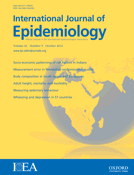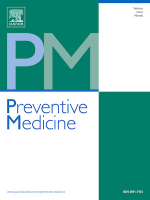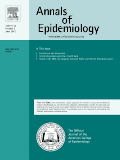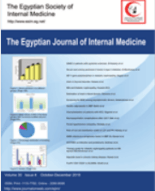
Current Epidemiology Reports
Scope & Guideline
Empowering Research for a Healthier Tomorrow
Introduction
Aims and Scopes
- Epidemiological Research and Methodologies:
The journal emphasizes empirical research studies that utilize a variety of epidemiological methodologies, including cohort studies, case-control studies, and cross-sectional studies, to investigate health outcomes and exposures. - Public Health Implications:
Current Epidemiology Reports prioritizes research that translates findings into public health practice, addressing issues such as health disparities, environmental health, and the impact of social determinants on health. - Interdisciplinary Approaches:
The journal encourages interdisciplinary research that integrates perspectives from sociology, psychology, public health, and environmental science to provide comprehensive insights into epidemiological issues. - Focus on Vulnerable Populations:
A consistent theme in the journal is the examination of health outcomes among vulnerable populations, including racial and ethnic minorities, children, and low-resource communities, aiming to highlight and address health inequities. - Emerging Health Issues:
Current Epidemiology Reports addresses contemporary health challenges, such as the health impacts of climate change, pandemics, and the effects of new technologies on health outcomes.
Trending and Emerging
- Environmental Epidemiology:
There is a rising focus on environmental factors affecting health, particularly studies examining the impact of air pollution, climate change, and environmental toxins on various health outcomes. - Mental Health and Epidemiology:
Research on mental health, particularly in the context of the COVID-19 pandemic, has gained prominence, highlighting the intersection of mental health with other epidemiological concerns. - Precision Public Health:
Emerging methodologies in precision public health are increasingly being explored, emphasizing tailored interventions based on individual risk profiles and environmental exposures. - Social Determinants of Health:
There is a growing emphasis on the role of social determinants in health outcomes, with studies investigating how socioeconomic status, education, and community factors influence health disparities. - Causal Inference and Advanced Statistical Methods:
The journal is witnessing an increase in the application of advanced statistical methods and causal inference techniques, reflecting an evolving understanding of complex health relationships and the need for robust analytical frameworks.
Declining or Waning
- Traditional Infectious Disease Epidemiology:
There has been a noticeable decline in studies focused on traditional infectious diseases, possibly due to a shift towards chronic disease epidemiology and the impact of emerging health threats such as non-communicable diseases. - Single-Disease Focus:
Research centered on isolated diseases without consideration of comorbidities or broader health contexts appears to be decreasing, as more studies adopt comprehensive and integrative approaches to health. - Basic Biostatistical Methods:
Papers focusing solely on basic biostatistical methods without application to real-world epidemiological problems are less frequent, indicating a move towards more complex and applied statistical methodologies. - Simplistic Risk Factor Analysis:
There is a waning interest in simplistic risk factor analysis that does not account for the multifactorial nature of health outcomes, as researchers increasingly embrace more nuanced models of health determinants. - Static Models of Health Interventions:
The trend of relying on static models for health interventions is declining, with a growing inclination towards dynamic modeling approaches that account for changing epidemiological landscapes.
Similar Journals

EPIDEMIOLOGY AND INFECTION
Fostering Knowledge for Global Health ChallengesEPIDEMIOLOGY AND INFECTION is a premier open-access journal published by Cambridge University Press, dedicated to advancing the field of epidemiology and infectious diseases. With an ISSN of 0950-2688 and E-ISSN of 1469-4409, this journal has been at the forefront of disseminating impactful research since its inception in 1970. As of 2023, it holds a prestigious Q2 ranking in both the fields of Epidemiology and Infectious Diseases, reflecting its significant contribution to these critical areas of study, with Scopus rankings placing it at #70 in Epidemiology and #163 in Infectious Diseases. The journal aims to publish high-quality, peer-reviewed studies that contribute to our understanding and management of infectious diseases globally. Operating under an open-access model since 2020, EPIDEMIOLOGY AND INFECTION ensures that research is accessible to a wide audience, fostering collaboration and innovation among researchers, professionals, and students alike. With a commitment to excellence, this journal is an essential resource for those looking to stay abreast of the latest developments in epidemiological research and infectious disease management.

INTERNATIONAL JOURNAL OF EPIDEMIOLOGY
Shaping the discourse in epidemiology and medicine.INTERNATIONAL JOURNAL OF EPIDEMIOLOGY, published by Oxford University Press, is a leading peer-reviewed journal established in 1972, dedicated to advancing the field of epidemiology and its applications in medicine. With an impressive impact factor and a Q1 ranking in both Epidemiology and Miscellaneous Medicine, this journal ranks among the top-tier publications in its category, reflecting its commitment to high-quality research and scholarship. The journal serves as a vital platform for researchers, professionals, and students to share innovative findings, methodologies, and insights in epidemiological science, thus contributing to the broader understanding of public health. The journal includes a diverse range of articles encompassing the latest trends and developments in the field, ensuring comprehensive access to essential information and promoting evidence-based practices. For those seeking rigorous academic discourse and the latest research, the INTERNATIONAL JOURNAL OF EPIDEMIOLOGY is an indispensable resource in the realm of health studies.

Preventive Medicine
Fostering evidence-based practices in preventive medicine.Preventive Medicine is a premier academic journal published by Academic Press Inc Elsevier Science, renowned for its influential contributions to the fields of Epidemiology and Public Health. Since its inception in 1946 and through its dedicated issues leading into 2024, the journal has established itself as a leading platform for cutting-edge research, boasting impressive Scopus rankings, with a notable Q1 status across relevant categories. This journal provides an essential forum for scholars, practitioners, and policy-makers interested in the prevention of diseases and the promotion of health within populations. With each issue, it disseminates valuable insights on preventive strategies, health behaviors, and epidemiological trends, making it crucial for anyone invested in the advancement of public health sciences. The journal does not offer open access options, ensuring that content remains relevant and targeted to its scholarly audience. Given its valuable contributions and recognition in the academic community, Preventive Medicine continues to play a pivotal role in shaping evidence-based approaches to health promotion and disease prevention in modern societal contexts.

Clinical Epidemiology and Global Health
Empowering knowledge for a healthier world.Clinical Epidemiology and Global Health, published by Elsevier - Division Reed Elsevier India Pvt Ltd, is a leading open-access journal dedicated to the dissemination of research in the crucial fields of epidemiology and global health. With an ISSN of 2452-0918 and an E-ISSN of 2213-3984, this journal has been a platform for innovative studies since its inception in 2013, converging into a comprehensive resource through 2024. Operating from the Netherlands and ensuring accessibility from anywhere in the world since its transition to an open-access model in 2021, it fosters the global exchange of knowledge. The journal's impact is reflected in its current quartile rankings, including Q2 in Public Health, Environmental and Occupational Health and Q3 in Epidemiology, Infectious Diseases, and Microbiology. With a growing reputation bolstered by SCOPUS rankings that place it in the top percentiles, Clinical Epidemiology and Global Health stands as an essential resource for researchers, professionals, and students dedicated to advancing public health and epidemiological research.

Pediatric Reports
Pioneering insights in pediatrics for a brighter tomorrow.Pediatric Reports is a distinguished open-access journal dedicated to the field of pediatrics, published by MDPI from its headquarters in Basel, Switzerland. Since its inception in 2009, the journal has aimed to advance the understanding and treatment of pediatric health through the publication of high-quality research articles, reviews, and clinical studies. With its current ranking in the Q2 category for Pediatrics, Pediatric Reports stands out in its commitment to disseminating innovative findings that contribute to the well-being of children. The journal is indexed in key databases and has gained recognition within the scientific community, as evidenced by its respectable Scopus rankings in Nursing and Pediatrics. Researchers, healthcare professionals, and students will find this journal to be an invaluable resource, as it fosters collaborative knowledge exchange and promotes evidence-based practices in pediatric care.

JOURNAL OF EPIDEMIOLOGY AND COMMUNITY HEALTH
Illuminating the path to healthier populations since 1978.JOURNAL OF EPIDEMIOLOGY AND COMMUNITY HEALTH, published by the esteemed BMJ PUBLISHING GROUP, stands as a leading journal in the fields of Epidemiology and Public Health. With an impressive impact factor and ranking in the Q1 quartile for both Epidemiology and Public Health categories as of 2023, it significantly contributes to the dissemination of critical research that shapes public health policies and practices globally. The journal has been a vital resource since 1978, continuously providing an academic platform for the latest advancements and discussions pertinent to community health, environmental concerns, and epidemiological studies. Researchers, professionals, and students alike depend on this influential publication for rigorous peer-reviewed articles, thereby enhancing its reputation as one of the top journals in the field. Despite the absence of Open Access options, the journal's scholarly contributions are evident, making it indispensable for anyone engaged in public health and epidemiological research.

ANNALS OF EPIDEMIOLOGY
Fostering Interdisciplinary Exchange for Global HealthANNALS OF EPIDEMIOLOGY, published by Elsevier Science Inc, stands as a leading journal in the field of epidemiology, with an impressive impact factor that reflects its significant contribution to public health research. With an ISSN of 1047-2797 and an E-ISSN of 1873-2585, the journal has been at the forefront of disseminating high-quality, peer-reviewed research since its inception in 1990. It is consistently ranked in the first quartile (Q1) for epidemiology in 2023, occupying the 29th position out of 148 in the Scopus Medicine category, with a percentage ranking in the 80th percentile. The journal aims to provide a comprehensive platform for the interdisciplinary exchange of pioneering epidemiological studies, exploring diverse health issues and their societal impacts. Researchers, professionals, and students alike will find valuable insights and innovative methodologies within its pages, making it an essential resource for anyone engaged in the study and application of epidemiology. Its headquarters located in the United States (STE 800, 230 Park Ave, New York, NY 10169) further reinforces its influence in the academic community.

Kesmas-National Public Health Journal
Innovating Health Policy for a Healthier TomorrowKesmas-National Public Health Journal is a vital platform for the dissemination of research in the field of public health, published by UNIV INDONESIA. With its ISSN of 1907-7505 and E-ISSN of 2460-0601, this Open Access journal has been committed to promoting accessible health knowledge since 2006. Based in Indonesia, the journal addresses critical areas of public health, including epidemiology, health policy, and environmental health, with the aim to foster health improvements in diverse communities. Despite its classification in the Q4 category across several important fields as of 2023, including Epidemiology and Public Health, the journal remains a unique resource for local and international researchers seeking to contribute to pressing public health issues. With its Scopus rankings reflecting persistent challenges within the discipline, Kesmas invites researchers, professionals, and students to engage with its content to drive impactful discussions and advancements in health policy and practice.

Epidemiologia & Prevenzione
Elevating the standards of epidemiological research.Epidemiologia & Prevenzione is a distinguished journal published by INFERENZE SCARL based in Italy, focused on advancing the fields of epidemiology and public health. Established in 1987, this journal serves as a pivotal platform for researchers, practitioners, and students to disseminate and exchange important findings related to epidemiology, as well as environmental and occupational health. With an HIndex that reflects its growing academic influence, it currently holds a Q3 quartile ranking in both Epidemiology and Public Health, highlighting its relevance in the scientific community. The journal is indexed in Scopus, ranked #368 in the field of Public Health and Environmental and Occupational Health, and #87 in Epidemiology, showcasing its commitment to high-quality research. Although it operates without an open access model, Epidemiologia & Prevenzione remains a vital resource in promoting knowledge and innovation for a healthier society, making it essential reading for anyone invested in these critical areas of study.

Egyptian Journal of Internal Medicine
Connecting Professionals, Advancing KnowledgeEgyptian Journal of Internal Medicine, published by SpringerNature, is a prestigious open-access journal that has been dedicated to advancing the field of internal medicine since its transition to open access in 2014. With an ISSN of 1110-7782 and an E-ISSN of 2090-9098, this journal provides a valuable platform for sharing peer-reviewed research, clinical studies, and reviews that address the latest developments and challenges in internal medicine. Although the journal does not currently have an H-index rating, it continues to foster collaboration and knowledge dissemination among researchers, professionals, and students globally. The journal's commitment to open access ensures that its articles are readily available to a wider audience, contributing to the advancement of medical science and practice. Situated in England, the Egyptian Journal of Internal Medicine serves as an essential resource for anyone interested in the complexities of internal medicine and aims to elevate the standard of care through robust scientific inquiry.